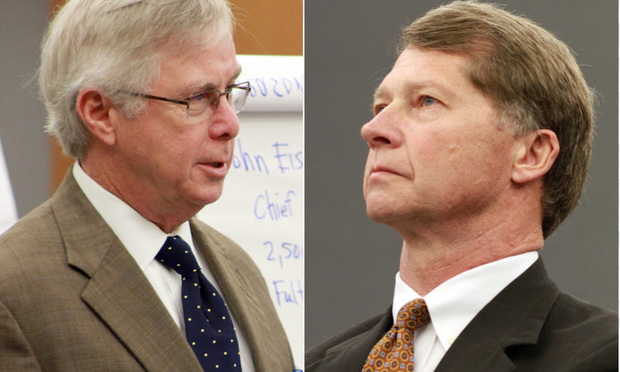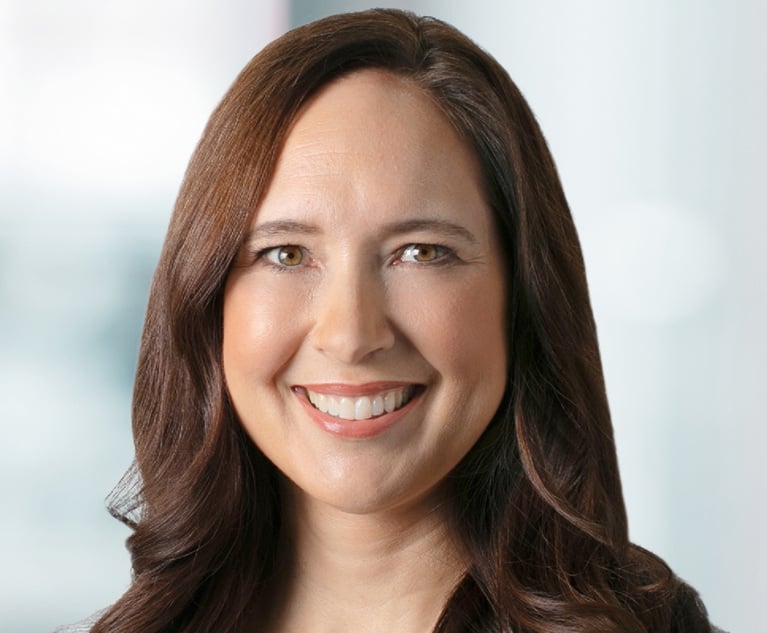Trial Ends, Fight Continues in Ford Roof Crush Case
Just before Gwinnett County State Court Judge Shawn Bratton declared the mistrial Friday morning, Ford filed motions for sanctions against Kim and Adam Hill, the two sons suing the company for the wrongful death of their parents. At least some of the issues could potentially carry forward into a new trial.
April 12, 2018 at 06:32 PM
5 minute read

The fight continues in a high stakes Ford Motor Co. roof crush case that ended in a mistrial after lawyers on both sides said their cases were damaged beyond repair.
Just before Gwinnett County State Court Judge Shawn Bratton declared the mistrial Friday morning, Ford filed motions for sanctions against Kim and Adam Hill, the two sons suing the company on behalf of their deceased parents. At least some of the issues could potentially carry forward into a new trial.
One said Ford “moves the court to impose sanctions for the spoliation of evidence—the bodies of Melvin and Voncile Hill.”
The spoliation motion seeks to exclude the autopsy report from the Hills' expert, Dr. Jonathan Eisenstat, which concluded they died from blunt impact to their head, neck, torso and extremities. The autopsy goes to the heart of the Hills' contention that their parents died because their Ford F-250 pickup truck roof crushed down on them during a rollover.
The fight that ended the trial was also over cause of death testimony. Ford lead counsel D. Alan Thomas of Huie Fernambucq & Stewart of Birmingham, Alabama, was questioning a defense witness, Dr. Thomas McNish, a medical doctor and aerospace expert. The final straw in a highly contentious trial came when Thomas asked McNish his opinion about what killed the Hills. McNish said the roof crush didn't kill them because milliseconds earlier they had other injuries from the roll, including their heads diving toward the roof and stopping while their bodies continued to move.
“Excuse me, Dr. McNish. Your honor, this is the exact testimony the court ordered before trial that this witness could not offer,” the Hills' lead counsel, Jim Butler of Butler Wooten & Peak in Columbus and Atlanta, said. “He's talking about cause of death.”
In a Feb. 12 order on 45 different plaintiffs' motions in limine, Bratton ruled, “The court does not find that Dr. McNish has sufficient skill or experience to provide expert opinion as to the cause of death of either decedent.”
At the moment McNish gave that testimony, Bratton discretely stopped the proceedings and sent the jury out for an early lunch. Outside the presence of the jury, the lawyers argued. After thinking about it over lunch, Bratton returned and said he was going to strike McNish's entire testimony as a sanction. But Butler said the jury was “poisoned” and that a mistrial was the only remedy.
Ford's counsel said they were irreparably harmed by losing McNish.
But as the dispute moves forward, even if Ford cannot use McNish's opinion about cause of death, the new motion, if granted, would prevent the Hills from presenting their autopsy report concluding that the couple died from head trauma.
Ford's motion said the “private autopsies” were “obscured by a suspicious haze,” since the company did not have representatives present. Plus, the motion contends, Ford cannot follow with its own autopsies because, once one is done, the bodies are no longer in the same condition as before.
“A duty existed to preserve the Hills' bodies. When plaintiffs exhumed the bodies and conducted ex parte autopsies, that duty was breached. Ford has been prejudiced by the loss and alteration of that evidence,” Ford's motion said. “The appropriate remedy is to strike the testimony of Dr. Eisenstat regarding the autopsy from the record.”
Or, Ford added, the judge could give the jury instruction on spoliation, saying “you may, but are not required to presume that the lost evidence would have been unfavorable” to the Hills.
Asked about Ford's autopsy motion, Butler said in an email ”the court has already ruled on [the autopsies] several times. Ford's pathologist admitted that Ford could have requested its own autopsies. Ford did not—obviously because Ford knew its own autopsies would confirm Dr. Eisenstat's findings. Instead … its defense team elected to make accusations against plaintiffs and plaintiffs' counsel.”
Butler also responded to Ford's other motion for sanctions on the day of the mistrial, which followed other motions from the Hills. Both sides said the other violated Bratton's orders on their motions in limine. In addition to the nine alleged violations of court orders in Ford's motion from the mistrial day, the company said it had identified 11 earlier ones that did not need to be mentioned again.
Butler called the accusations of court order violations “nonsense.”
One of Ford's accusations of violations was against not the lawyers but plaintiff Kim Hill. The company asked to strike his testimony on cross-examination when he told Ford attorney Randy Evans of Dentons that all he wanted was for Ford to take back every truck “that's got the same roof like my parents.” Hill said he wanted Ford to buy back those trucks at list price and destroy them, plus pay his lawyers' fees. “If y'all can do that, y'all don't owe us anything, not a dime,” Hill said from the stand.
Ford said Hill's testimony violated the court's order granting its “Motion in Limine No. 2,” precluding “argument or testimony inferring the existence of a duty to recall.”
Butler, in response, said Ford willfully violated court orders with which it disagreed.
No new trial date has been set.
The case is Hill v. Ford, No. 16 C 04179-2.
This content has been archived. It is available through our partners, LexisNexis® and Bloomberg Law.
To view this content, please continue to their sites.
Not a Lexis Subscriber?
Subscribe Now
Not a Bloomberg Law Subscriber?
Subscribe Now
NOT FOR REPRINT
© 2025 ALM Global, LLC, All Rights Reserved. Request academic re-use from www.copyright.com. All other uses, submit a request to [email protected]. For more information visit Asset & Logo Licensing.
You Might Like
View All
A Plan Is Brewing to Limit Big-Dollar Suits in Georgia—and Lawyers Have Mixed Feelings
10 minute read
On The Move: Kilpatrick Adds West Coast IP Pro, Partners In Six Cities Join Nelson Mullins, Freeman Mathis
6 minute read

Did Ahmaud Arbery's Killers Get Help From Glynn County DA? Jury Hears Clashing Accounts
Trending Stories
- 1Judge Recommends Disbarment for Attorney Who Plotted to Hack Judge's Email, Phone
- 2Two Wilkinson Stekloff Associates Among Victims of DC Plane Crash
- 3Two More Victims Alleged in New Sean Combs Sex Trafficking Indictment
- 4Jackson Lewis Leaders Discuss Firm's Innovation Efforts, From Prompt-a-Thons to Gen AI Pilots
- 5Trump's DOJ Files Lawsuit Seeking to Block $14B Tech Merger
Who Got The Work
J. Brugh Lower of Gibbons has entered an appearance for industrial equipment supplier Devco Corporation in a pending trademark infringement lawsuit. The suit, accusing the defendant of selling knock-off Graco products, was filed Dec. 18 in New Jersey District Court by Rivkin Radler on behalf of Graco Inc. and Graco Minnesota. The case, assigned to U.S. District Judge Zahid N. Quraishi, is 3:24-cv-11294, Graco Inc. et al v. Devco Corporation.
Who Got The Work
Rebecca Maller-Stein and Kent A. Yalowitz of Arnold & Porter Kaye Scholer have entered their appearances for Hanaco Venture Capital and its executives, Lior Prosor and David Frankel, in a pending securities lawsuit. The action, filed on Dec. 24 in New York Southern District Court by Zell, Aron & Co. on behalf of Goldeneye Advisors, accuses the defendants of negligently and fraudulently managing the plaintiff's $1 million investment. The case, assigned to U.S. District Judge Vernon S. Broderick, is 1:24-cv-09918, Goldeneye Advisors, LLC v. Hanaco Venture Capital, Ltd. et al.
Who Got The Work
Attorneys from A&O Shearman has stepped in as defense counsel for Toronto-Dominion Bank and other defendants in a pending securities class action. The suit, filed Dec. 11 in New York Southern District Court by Bleichmar Fonti & Auld, accuses the defendants of concealing the bank's 'pervasive' deficiencies in regards to its compliance with the Bank Secrecy Act and the quality of its anti-money laundering controls. The case, assigned to U.S. District Judge Arun Subramanian, is 1:24-cv-09445, Gonzalez v. The Toronto-Dominion Bank et al.
Who Got The Work
Crown Castle International, a Pennsylvania company providing shared communications infrastructure, has turned to Luke D. Wolf of Gordon Rees Scully Mansukhani to fend off a pending breach-of-contract lawsuit. The court action, filed Nov. 25 in Michigan Eastern District Court by Hooper Hathaway PC on behalf of The Town Residences LLC, accuses Crown Castle of failing to transfer approximately $30,000 in utility payments from T-Mobile in breach of a roof-top lease and assignment agreement. The case, assigned to U.S. District Judge Susan K. Declercq, is 2:24-cv-13131, The Town Residences LLC v. T-Mobile US, Inc. et al.
Who Got The Work
Wilfred P. Coronato and Daniel M. Schwartz of McCarter & English have stepped in as defense counsel to Electrolux Home Products Inc. in a pending product liability lawsuit. The court action, filed Nov. 26 in New York Eastern District Court by Poulos Lopiccolo PC and Nagel Rice LLP on behalf of David Stern, alleges that the defendant's refrigerators’ drawers and shelving repeatedly break and fall apart within months after purchase. The case, assigned to U.S. District Judge Joan M. Azrack, is 2:24-cv-08204, Stern v. Electrolux Home Products, Inc.
Featured Firms
Law Offices of Gary Martin Hays & Associates, P.C.
(470) 294-1674
Law Offices of Mark E. Salomone
(857) 444-6468
Smith & Hassler
(713) 739-1250






